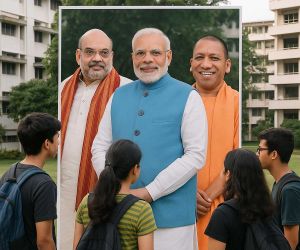MORE COVERAGE
Twitter Coverage
Satyaagrah
Written on
Satyaagrah
Written on
Satyaagrah
Written on
Satyaagrah
Written on
Satyaagrah
Written on
JOIN SATYAAGRAH SOCIAL MEDIA
"London's glitter hides its children's hunger": 1 in four children in the UK lack nutritious meals, amidst London's opulence, a stark hunger crisis emerges, revealing a G7 nation's disturbing reality, Akshaya Patra Foundation unveils these shocking stats

London - While the city of London enjoys a global reputation for its opulence and economic might, an astonishing revelation has surfaced: close to a quarter of its children lack access to a nutritious meal. This alarming statistic has been brought forward by none other than the Akshaya Patra Foundation (TAPF), an organization internationally recognized for distributing the highest number of mid-day meals globally.
|
When news broke out that the same foundation had initiated the service of free meals in the bustling British capital, it was met with considerable surprise. In a candid conversation with Indian Narrative, Bhawani Singh Shekhawat, Global Mentor and Trustee of TAPF UK, shed light on the reasons behind this unexpected venture.
Drawing a parallel to its operations in India, Shekhawat elucidated, "The very ethos that drove us to feed school children in India is what inspired us to extend our services in the UK." He highlighted a grave, yet overlooked issue - the vulnerability of a significant segment of British children to the ongoing food crisis.
Akshaya Patra, renowned for its PPP (Public Private Partnership) model in India, has adapted its strategy to the UK context. In a bid to cater to local preferences, the charity now delivers hot, fresh, and nutritionally-balanced meals tailor-made to suit British tastes.
London - When asked about the foundation's motivation to begin free meal services in a wealthy city such as London, Bhawani Singh Shekhawat responded with deep reflection. He said, “Akshaya Patra was established two decades ago, grounded in India's inherent strengths. The intent was to catalyze a genuine transformation.”
He described a rapidly urbanizing India, with its burgeoning cities offering a plethora of job opportunities and educational prospects. However, this urban migration came at a cost. “People migrating to cities left behind not just their homes, but also a food secure system characteristic of rural setups,” explained Shekhawat. He stressed that while rural regions had their set of challenges, a complete lack of food wasn't one of them. This vital safety net, however, is glaringly absent in cities.
|
|
Drawing from this Indian experience, he emphasized, “Our narrative in India revolved around ensuring no child is deprived of education and food because of urban vulnerabilities. And we noticed resonances of this issue even here in the UK.”
Although the foundation had been fundraising in the UK since 2010, the real turning point was a startling revelation in the British House of Commons. “An all-party report on hunger illuminated the stark reality – over a million children were going without food in the UK, a situation exacerbated during school holidays.”
Having worked extensively in India to eradicate hunger among school children, the Akshaya Patra Foundation was taken aback when they were confronted with a similar issue in a nation as prosperous as the UK.
"I couldn't believe it. Here was the UK, a G7 nation, with staggering numbers pointing towards a hunger epidemic among its children," Shekhawat remarked. The gravity of the situation was felt profoundly when, despite the country's affluence, they discovered that 1.2 million children were facing food insecurity.
Eager to delve deeper into this unexpected crisis, Akshaya Patra leveraged its partnership with the esteemed London Business School. "Their findings were even more startling than we had imagined," said Shekhawat. With such pressing revelations, the foundation pondered, "If we don't act now, when will we?"
|
|
Though 2018 marked the commencement of their endeavours in the UK, it wasn't smooth sailing. The world was hit by the pandemic, making the hunger crisis even graver, especially for vulnerable sections like families, university students, the elderly, and the homeless. "The fallout of Covid, coupled with the surge in food inflation in the UK to an astonishing 17%, intensified the hardships faced by the already struggling sections of society," Shekhawat highlighted.
With mounting evidence of food poverty, he continued, "Now, there are conclusive reports suggesting that nearly a quarter of British children are deprived – they're either malnourished or consuming subpar food."
Addressing the inherent challenges of an Indian organization intervening in the UK, Shekhawat admitted that they faced skepticism. "Many raised eyebrows, questioning the intent of an Indian organization trying to alleviate hunger in Britain."
The audacity of Akshaya Patra's mission in the UK wasn't met without skepticism. The traces of colonial memories, coupled with cultural misconceptions about India's dietary preferences, were barriers. "It seemed ironic that as vegetarians and as representatives of a once-colonized nation, our intentions were being questioned," Shekhawat shared with a tinge of exasperation.
Yet, the opposition only fuelled Shekhawat's drive. "It's always personal encounters that unveil the harshest realities," he remarked. Interactions with the deprived altered his perspective completely, making the foundation's mission even more resolute. In the midst of doubters who said, "Bhawani, you're wasting your time," Shekhawat saw hunger-stricken faces that told a different story.
In their pursuit to make a significant change, the foundation partnered with a local British organization, God My Silent Partner (GMSP). "Our collaboration with GMSP was pivotal," said Shekhawat. "Their support enabled us to set up our first-ever kitchen in the UK." And this wasn't just any kitchen. It was one where between 5,000-7,000 meals were prepared daily, with the foundation serving an impressive 700,000 meals since the close of 2020.
|
"We have meticulously tailored our meals to the UK's taste," Shekhawat asserted. "Our dishes exceed government nutritional guidelines, and they're cost-effective too." With this robust system in place, they've ensured that the homeless, the elderly, and university students don't go to bed on an empty stomach.
In the midst of affluence, the underbelly of hunger in the UK has been startlingly exposed. It’s a testament to the resilience and vision of organizations like Akshaya Patra that such issues are being confronted head-on. Breaking through skepticism and geographical boundaries, they stand as an embodiment of transcending limitations, all for the noble cause of eradicating hunger. Through their endeavors, we are reminded that compassion has no borders.
London, once symbolic of the world's affluence, today grapples with an unsettling revelation: nearly a quarter of its children are deprived of a nutritious meal. The gravity of this situation becomes starkly evident when juxtaposed against the backdrop of the city's financial prowess.
The Akshaya Patra Foundation (TAPF), an entity synonymous with the world's largest mid-day meal initiative, launched its quest against hunger not in a third-world backdrop but rather, surprisingly, in the heart of London.
Why London, a bastion of global wealth? Bhawani Singh Shekhawat, the Global Mentor and Trustee of TAPF UK, delineates the parallels of their mission in India and the UK, asserting that the essence remains unaltered. "Whether it's an urban center in India or the streets of London, children should not have to choose between food and education," Shekhawat expressed.
|
While the foundation's inception in India was driven by the idea of ensuring no child goes hungry in burgeoning cities, its inception in the UK was a revelation. Their role as a fundraising organization since 2010 gave them insights into the UK's hunger plight. The realization that over a million children faced hunger in a G7 nation was unfathomable.
The research that followed painted a bleaker picture, intensified by the socio-economic repercussions of the COVID pandemic. Food inflation, touching a staggering 17% in the UK, further marginalized the vulnerable – the poor, the homeless, the elderly, and university students.
Against the backdrop of skepticism and the challenge of adapting to a foreign land, Shekhawat candidly reflects on the early days: "We faced skepticism due to our origins and our vegetarian tenets, but adversity only strengthened our determination."
Their partnership with the British organization - God My Silent Partner (GMSP) - further validated their mission. The outcome was a state-of-the-art kitchen dishing out between 5,000-7,000 meals daily, with a tally of nearly 700,000 meals by the end of 2020.
A novel culinary approach in the UK: The sheer diversity in TAPF's menu speaks volumes of their meticulous planning. With a spread that spans from shepherd’s pie, lasagna to biryani, they've crafted a menu that caters to British tastes, yet remains intrinsically nutritious. "Our goal is to offer food high in 'Prana' - life force, essential for a child's cognitive functions in a classroom," emphasized Shekhawat.
In a nation where the gastronomical landscape is vast, the introduction of hot, vegetarian meals could have been a gamble. However, TAPF’s offerings have resonated with their recipients, showing that what truly matters is the quality and intention behind the meal.
|
Diving deeper into the ethos of the Akshaya Patra Foundation, we approach a salient inquiry: Could a charity's origin, seemingly rooted in India's diverse cultural landscape, influence perceptions in a Western nation like the UK?
When queried on whether the foundation’s efforts might be misconstrued as a religious initiative, Shekhawat asserts, “In the UK, the intermingling of faith, service, and charity is a time-honoured tradition. Thus, questions about our religious affiliations or motivations rarely surface.” Notably, TAPF's endeavours in London transcend religious boundaries; church-based organizations actively participate in their mission, and Muslim taxi drivers contribute by ferrying food throughout the city.
What stands out in Shekhawat’s discourse is his unyielding focus on the universal appeal of nutrition, transcending divisive narratives. “While meat consumption is riddled with individual preferences – be it halal, kosher, or other criteria – vegetarian meals offer an unambiguous solution. They cater to everyone, ensuring optimum nutrition at an accessible cost,” he remarks.
The crux of the matter is a poignant reflection on why food, a basic human necessity, should ever be enmeshed in political or divisive debates. Shouldn’t the focus pivot to addressing the palpable nutritional deficit in children worldwide? Shekhawat raises a compelling point on the stark reality: globally, children's consumption of fruits and vegetables is alarmingly low.
|
Endorsing vegetarian meals as the beacon in this scenario, Shekhawat elaborates on TAPF's practical yet visionary strategy: “Our vegetarian initiative encapsulates the essence of low cost, high nutrition, and wide reach.” Highlighting the logistical challenges of meat-based diets – from procurement and transportation to storage and safety – he underscores the elevated costs and complexities tied to animal-based proteins.
In essence, Akshaya Patra’s commitment in the UK underlines a profound message: that nutrition, compassion, and unity should be the universal languages spoken, undeterred by geographies, religions, or perceptions.
Probing deeper into the reception of these free meals, Shekhawat reveals, “Feedback is instrumental in shaping our approach. It was through this channel that we became privy to the nutritional struggles faced by the elderly.” The foundation liaises with local councils and school head teachers, ensuring that its meals resonate with the beneficiaries' preferences.
He goes on to elaborate on their collaborative approach, sharing that “When introducing new dishes, we enga
|
ge children and parents in the process – from ideation to actual cooking. This not only nurtures a sense of community but also ensures the meals are well-received.”
Addressing the looming shadows of the cost-of-living and global food crises, Shekhawat acknowledges the grave challenges faced by humanity. “The glaring dichotomy of half the world battling hunger while the other half grapples with obesity underscores a massive nutrition deficit,” he observes. While he refrains from speculating on a global food shortage, he underscores the urgency of addressing the disparities in food and nutrition. He finds solace in the fact that the UK’s ‘poverty maps’ and ongoing national dialogues on food and nutrition are steering public conversations. “It’s heartening to witness influential figures vocalizing concerns about poverty and food in the UK,” Shekhawat notes.
In conclusion, the Akshaya Patra Foundation's work in the UK serves as a testament to the profound impact that a determined entity, rooted in compassion and pragmatism, can have in addressing systemic challenges. It's a stirring reminder that in the fight against global hunger and malnutrition, every meal, every initiative, and every conversation counts.
 Support Us
Support Us
Satyagraha was born from the heart of our land, with an undying aim to unveil the true essence of Bharat. It seeks to illuminate the hidden tales of our valiant freedom fighters and the rich chronicles that haven't yet sung their complete melody in the mainstream.
While platforms like NDTV and 'The Wire' effortlessly garner funds under the banner of safeguarding democracy, we at Satyagraha walk a different path. Our strength and resonance come from you. In this journey to weave a stronger Bharat, every little contribution amplifies our voice. Let's come together, contribute as you can, and champion the true spirit of our nation.
 |  |  |
| ICICI Bank of Satyaagrah | Razorpay Bank of Satyaagrah | PayPal Bank of Satyaagrah - For International Payments |
If all above doesn't work, then try the LINK below:
Please share the article on other platforms
DISCLAIMER: The author is solely responsible for the views expressed in this article. The author carries the responsibility for citing and/or licensing of images utilized within the text. The website also frequently uses non-commercial images for representational purposes only in line with the article. We are not responsible for the authenticity of such images. If some images have a copyright issue, we request the person/entity to contact us at This email address is being protected from spambots. You need JavaScript enabled to view it. and we will take the necessary actions to resolve the issue.
Related Articles
- "It is amazing how complete is the delusion that beauty is goodness": England - Mosque's weekly call to prayer broadcast approved, local objections dismissed as 'racist', Councillor Louise Baldock said “It’ll bring much pleasure to the Muslim community”
- "दुआ़-ए-मंज़िल": Mohamed Iidow repeatedly raped Natalie Shotter, NHS worker and mother of three, while she lay unconscious on a park bench in Southall, leading to her death; CCTV footage captured the brutal assaults, and a court hearing begins
- "From tackles to turmoil: Kabaddi's UK saga": A joyous Kabaddi event turns sinister in Derby as masked men, swords in hand, interrupt the games. Amidst Khalistani flags, the game's spirit is overshadowed by the sound of clashes and screams
- "Dignity, not Disrespect: The Call for Justice": During Ganesh Chaturthi in Leicester, a harrowing episode unfolded as a police officer exhibited stark misconduct towards an elderly Hindu priest, igniting widespread outrage and calls for immediate action
- Satyam Surana's harrowing experience at LSE, tainted by vicious smear campaign & blatant political bias, reflects a troubling trend of adversity tormenting Indian students like Rashmi Samant & Karan Kataria, exposing deep-rooted systemic issues in England
- Churchill's Old War Office, once a bastion of British power seized by Indians, behold as karma unfolds, Hinduja Group to transform his last memorial in London into a beacon of luxury, a testament to India's soaring global stature and boundless creativity
- In a historic move, Maharashtra rejoices as Shivaji Maharaj's iconic weapon, the 'Wagh Nakh', making its triumphant return from the UK, relive the tale of this legendary weapon, embodying Shivaji's strategic genius and India's rich martial heritage
- London's Trocadero surrenders to the Karma of England's Colonial Past: New Mosque to bring inclusivity, Muslim billionaire Asif Aziz wins permission to turn one of central London's most famous landmarks and entertainment complexes into a mosque
- "Mirage shattered": London's charm fades as thefts rise, making Delhi a haven for Indian businessmen; luxury watches targeted, with 29,000 stolen in 5 years, sparking undercover stings in a city where Dickens' tales meet startling modern-day crime stats
- "Fake news thrive because few verify what's real and always bias towards content that reinforces their own biases": Controversial Islamist Majid Freeman, who fanned Leicester riots with fake news, meets Leicester Mayor to peddle more poison against Hindus
- “When did the future switch from being a promise to being a threat?”: Mob of 200 Muslims with chants of ‘Allahu Akbar…Takbir’ attacks Durga temple in Smethwick as cops look on after vandalizing a Hindu temple and desecrating a saffron flag in Leicester
- "Sunak, wake up": Hindu families terrorized by Islamists in West Midlands, spine-chilling details of relentless persecution, labeled ‘Kafir,’ but Police deny hate crime citing 'no evidence,' yet a recent case implicates a British Muslim cop in the torment
- "Important thing to know about an assassination is not who fired the shot, but who paid for the bullet": Iran plotted assassination on UK soil, tried to kill ten 'enemies of the regime' in Britain, MI5 warns of 'very real' threat posed by China and Russia
- "When you take charge of your own narrative, it gives you a handle on it": Islamist jihadis unleash misinformation war on the Hindus in the UK that led to communal riots in Leicester, temple attack and several homes of Hindu targeted, police call out lies
- "Why not upset the apple cart? If you don't, the apples will rot anyway": Omar, Khalid, Jameel, Syed, Abbas, Musadaq, Amjad, Burhan, Asif, Shazad, Ibrahim, Ashfaq, Yousaf, Bhatti and others charged for raping minor girl for 4 yrs: Bradford child sex abuse

























